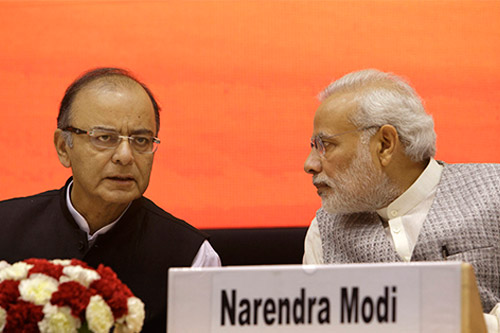FM to invite comments on the draft business processes on GST registration,refund and payments
Dated 16th October, 2015
 The Union government and states have completed the drafting of model Goods and Services Tax law as well as an integrated-GST or iGST law, which will be put up in public domain by next month.
The Union government and states have completed the drafting of model Goods and Services Tax law as well as an integrated-GST or iGST law, which will be put up in public domain by next month.
According to officials privy to the matter, the Empowered Committee of State Finance Ministers is likely to meet this month later to discuss the legislations CGST, SGST and iGST. And a copy of the model GST and iGST has been circulated among the states for their opinion.
Based on the model the separate laws for Centre and states will be made.
According to officials, three key areas of concern including definitional clarity, certainty in assessment and ease of doing business were taken into account.
Meanwhile, Union ministry of finance has invited comments on the draft business processes on GST registration, GST refunds and GST payments.
The draft business processes on GST registration, GST refunds and GST payments have been put up on mygov portal for inviting comments. A statement by the ministry says that comments and views are invited on these business processes by October 31, 2015. The draft model CGST, SGST and iGST laws, along with GST business processes for filing of returns, shall also be put up for inviting comments of stakeholders in due course.
The ministry statement read thus, “The Government of India intends to introduce the Goods and Services Tax (GST) in the country at the earliest. GST seeks to subsume many indirect taxes at the Central and state level. The proposed dual GST envisages taxation of the same taxable event, i.e., supply of goods and services, simultaneously by both the Centre and the states.”
The Constitution (One Hundred and Twenty-Second Amendment) Bill, 2014, has been introduced in Parliament for facilitating the introduction of GST in the country. Simultaneously, committees comprising officers from the Central government, as well as state governments, have been constituted for the drafting of model CGST, SGST and iGST laws, and GST business processes of registration, refunds, returns and payments.
Recently, speaking at the 3rd CII Global Tax Summit organised in Delhi, V S Krishnan, member, service tax, CBEC, ministry of finance, clarified that missing the April 1, 2016, deadline does not mean going to April 1, 2017. GST can be implemented anytime during the year, once the Bill is passed. One committee is already working on the GST rate structure and it is expected to submit its report very shortly.
In addition, the Empowered Committee is working with think tank NIPFP on the Revenue Neutral Rate, based on a fresh set of data. He assured the industry that the rate should not exceed 20%.
Krishnan reiterated that drafting of the GST law has already been done and it would be given to the Empowered Committee for inputs. Thereafter, it would be put in the public domain for comments. In addition, the draft Place of Supply rules will also be made public for comments.
A lot of groundwork needs to be done on GST by industry associations. Industry needs to identify challenges in the transitional provisions to the new GST legislation as well as suggest solutions to the problems, he said.





